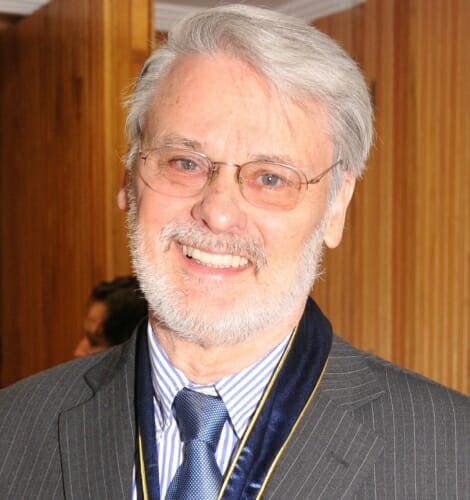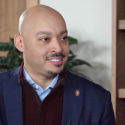Q&A: A founder of distance education weighs in on its educational benefits
Michael G. Moore often likes to shock audiences by telling them that distance education can be not only more economical than classroom instruction, but, importantly, just as good of a learning experience.
“I believe it passionately,” Moore says. “Whether one agrees or not, it is where I have stood for decades.”
Already a seasoned educator after a decade of teaching in his native United Kingdom and East Africa, Moore developed a theory and definition of distance education while a graduate student at UW–Madison in the 1970s. He is considered a founding father of the discipline — the first to advance a statement of pedagogical theory for education that is not in the classroom.
Many other firsts followed. Moore proposed and helped plan the first national conference on distance education at UW–Madison in 1985. The conference continues to be held each summer on campus. Moore established the American Center for the Study of Distance Education at Pennsylvania State University, and he launched the American Journal of Distance Education.
In February, Moore, 82, a distinguished professor emeritus at Penn State, was announced by UW–Madison as a recipient of an honorary degree for a career of extraordinary accomplishment. The degree initially was to be conferred at spring commencement. Due to COVID-19, the conferral has been rescheduled for winter commencement in December.
COVID-19 also has upended the delivery of education for much of the country, forcing most of it online. (UW–Madison announced in March that the rest of the spring semester would be conducted solely online.) As the world flocks to distance education, we asked Moore to share some thoughts. He spoke with us by phone from his home in Groton, Massachusetts.
Suddenly, the discipline you’ve devoted your career to is on everyone’s mind. What is this moment like for a scholar of distance education?
It’s bittersweet. The sweet part is that, at last, people are finally being compelled to look at its possibilities. The bitter is that I’m afraid a lot of it will be done poorly because not enough teachers have the know-how to take advantage of its strengths. I’m not happy about the prospect that, somewhere down the road, people will be saying, “Well, yes, we tried that, but it was a miserable experience.”
How can an instructor avoid disaster?
What I would say to a teacher is, if you’re someone who likes to be very unstructured and spontaneous and wander around the classroom, that’s very dangerous online. The teacher must design and follow a lesson structure. That’s first and foremost. Everything follows from that. Distance education should be better structured than face-to-face instruction in terms of knowing the expected outcomes at every step of the way.
Related: 10 tips for instructors on effective distance education
Practical suggestions from Michael G. Moore on how to plan lessons, how to set learning objectives, what kinds of resources to use, how much to talk, and more.
You’ve said that distance education, when done right, can be wonderful. What are its best aspects?
When done right, from the student’s perspective, it delivers a more personal experience. It provides more freedom for personal exploration and more individualized support, including specialized help for those with learning issues.
How should a student approach distance education?
My advice to students is to understand that the learning is your responsibility. You’ll have more freedom, but you’ll need to do more to direct your course of study. Face up to the opportunity to manage more of your own life, which means managing your time.
What practical tips would you offer students along those lines?
It’s more important than ever to develop strong study habits. Lay down a rule of where and when to study. You’re not being pulled into the classroom at 9 a.m., so you have to make your own learning time and your own learning place. If you just do it whenever and wherever you want — at the kitchen table today, on your bed tomorrow — you won’t develop the discipline that’s needed.
You did your early groundbreaking work on distance education at UW–Madison and have maintained strong ties to the institution. How do you think the university will do in delivering distance education?
In Madison, you’ve got experts and you’ve got expertise. Long before there was online teaching, there was distance education. The University of Wisconsin was a national leader in teaching students at home by sending lessons through the postal system, then teaching by television, by radio, by telephone in the 1970s, two-way video systems in the 80s, early computer networks in the 1990s, and finally internet networks. Then in the late 1960s, UW professor Charles Wedemeyer demonstrated how you get better teaching when you link these technologies together and use teams of experts to produce teaching programs that are better than any individual teacher could manage alone. So you have a deep tradition of how to do good distance education.
When you’re feeling optimistic, what do you think this crisis could mean for the future of distance learning?
This could be a turning point in education as more people learn there are other ways of teaching and learning. My own granddaughter is enjoying her online elementary class, and I’m enjoying my piano lessons via Zoom! So while not all students will be experiencing the best of what distance education can offer, I hope most of them will be pleasantly surprised at how good and enjoyable it can be.
Tags: covid-19, learning, teaching, technology





